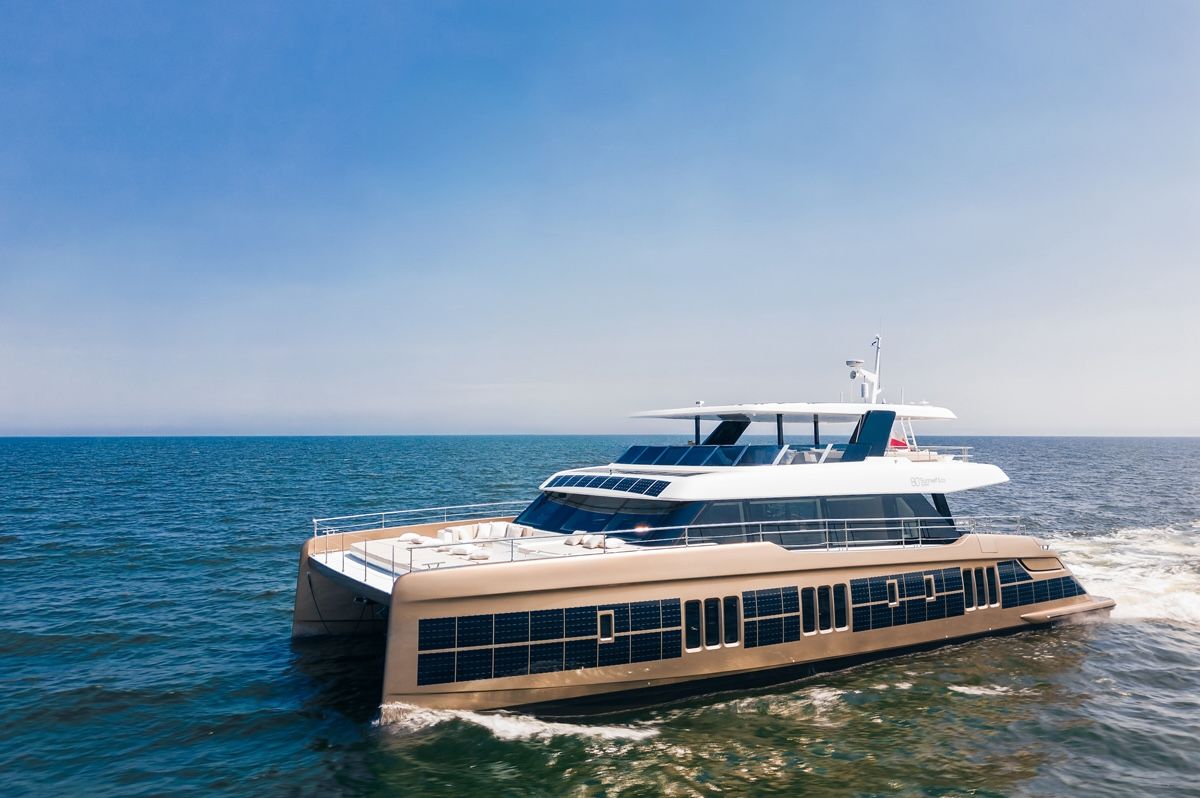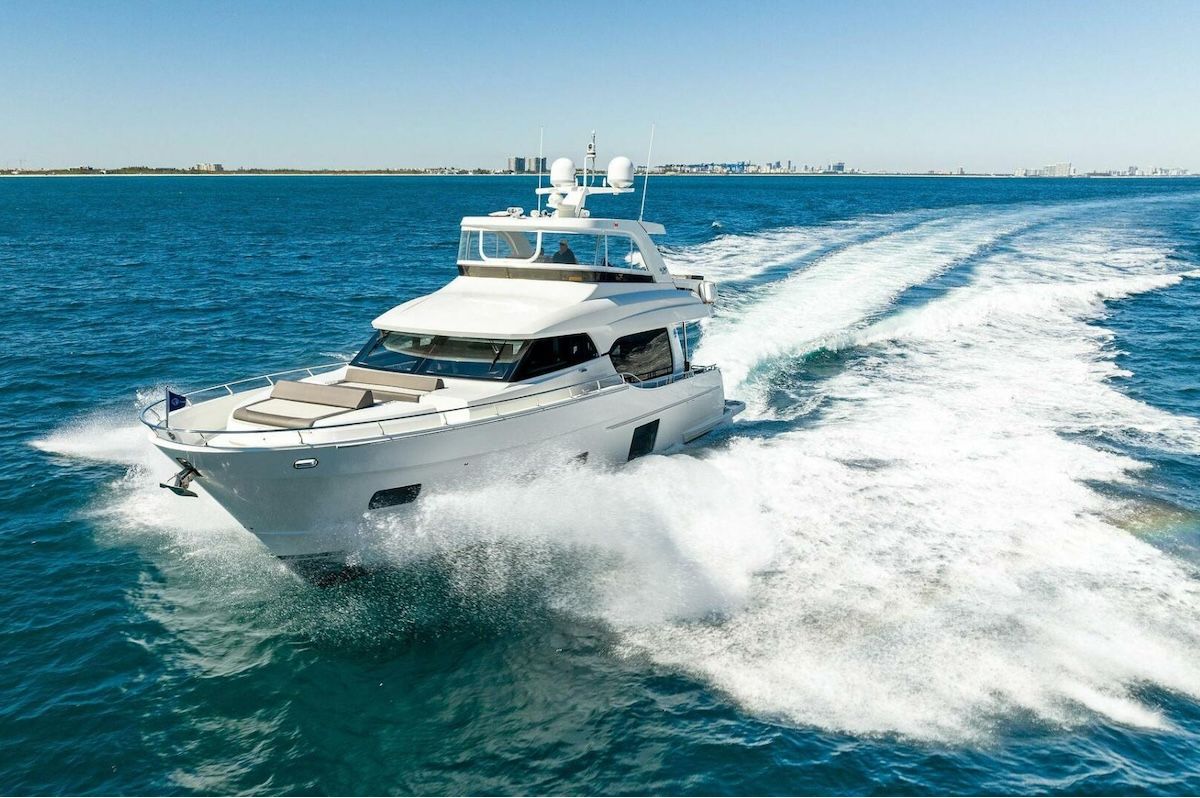10 Reasons a Yacht Will Sell Successfully

Selling a yacht can be both exciting and daunting. It's not just about finding the right buyer, but also about presenting your vessel in the best possible light and navigating the complexities of the sales process. Whether you're a seasoned yacht owner or a first-time seller, maximizing your chances of a successful sale requires careful planning and execution. Here are 10 reasons why a yacht will sell successfully, along with tips on how to address common questions and challenges:
1. Boat Preparation:
First impressions matter, especially in the world of yacht sales. Before listing your yacht, invest time and effort into thoroughly cleaning and preparing it for viewings. A clean, well-maintained vessel not only looks more attractive to potential buyers but also signals that it has been cared for properly.
Addressing Common Questions:
What maintenance tasks should I prioritize before listing?
Before listing your yacht for sale, prioritize maintenance tasks that enhance its appearance, functionality, and safety. Start with cosmetic improvements such as cleaning, polishing, and repairing any visible signs of wear and tear. Next, address any mechanical issues or necessary repairs to ensure the yacht is in optimal working condition. This may include servicing the engine, checking electrical systems, inspecting plumbing, and replacing worn-out components. Additionally, consider investing in upgrades or enhancements that increase the yacht's appeal to potential buyers, such as modernizing amenities or adding new features. Finally, don't forget about safety-related maintenance, such as inspecting life-saving equipment, ensuring proper functioning of navigation systems, and checking firefighting equipment. By prioritizing these maintenance tasks, you can present your yacht in the best possible light and attract more interested buyers.
Should I invest in any upgrades or repairs?
Deciding whether to invest in upgrades or repairs before listing your yacht for sale depends on various factors, including the yacht's condition, market demand, and your budget. In general, addressing necessary repairs that affect the yacht's functionality, safety, or aesthetics is essential to maximize its saleability and value. However, major upgrades or renovations should be approached cautiously, as they may not always yield a significant return on investment. Focus on improvements that offer a good balance of cost-effectiveness and appeal to potential buyers, such as updating essential systems, refreshing outdated interiors, or enhancing onboard amenities. Consulting with a yacht broker or professional surveyor can help you prioritize upgrades and repairs that will have the most impact on the sale while staying within your budget constraints.
2. Remove Personal Items:
While your personal touches may make the yacht feel like home to you, they can be distracting to potential buyers. Clearing out personal items such as photos, clothing, and personal decor allows buyers to envision themselves aboard the vessel.
Addressing Common Questions:
What personal items should I remove?
Remove personal items such as photographs, clothing, toiletries, and personal decorations. Clearing these items helps potential buyers envision themselves aboard the yacht without feeling like they're intruding on someone else's space.
How do I depersonalize the yacht without making it feel sterile?
Depersonalizing the yacht while maintaining its warmth and appeal requires a delicate balance. Here are some tips to achieve depersonalization without making the yacht feel sterile:
Remove Personal Items: Start by removing personal items such as family photos, personal artwork, and knick-knacks. Clearing these items helps create a neutral canvas for potential buyers to envision themselves in the space.
Neutralize Decor: Replace any overly personalized or taste-specific decor with neutral alternatives. Opt for simple, elegant accents such as throw pillows, blankets, and decorative objects in neutral colors and classic styles.
Minimize Clutter: Declutter surfaces and storage areas to create a sense of space and openness. Store away unnecessary items and keep countertops, shelves, and cabinets tidy and organized.
Focus on Cleanliness: Prioritize cleanliness throughout the yacht, from the deck to the interior spaces. Deep clean all surfaces, including floors, countertops, and upholstery, to create a fresh and inviting atmosphere.
Enhance Ambiance: Use soft lighting, such as lamps and candles, to create a warm and inviting ambiance onboard. Consider adding ambient lighting fixtures or string lights to enhance the yacht's atmosphere during viewings.
Add Fresh Touches: Incorporate fresh flowers, plants, or bowls of fruit to add a pop of color and freshness to the space. These simple touches can enliven the yacht's interior without overwhelming it with personal flair.
Highlight Features: Showcase the yacht's standout features and amenities, such as luxurious furnishings, state-of-the-art electronics, or spacious outdoor lounging areas. Draw attention to these selling points to capture buyers' interest and imagination.
Create a Welcoming Environment: Set the stage for a welcoming and comfortable viewing experience by providing cozy seating areas, soft textiles, and inviting outdoor spaces. Consider adding cushions, blankets, and outdoor furniture to create inviting gathering spots.
By depersonalizing the yacht while maintaining its warmth and charm, you can create a welcoming environment that appeals to a wide range of potential buyers. Striking the right balance between depersonalization and ambiance is key to showcasing the yacht's true potential and maximizing its saleability.
3. Boat Evaluation:
Before listing your yacht for sale, conduct a thorough evaluation to assess its condition, features, and market value. Understanding your yacht's strengths and weaknesses allows you to set a competitive asking price and market it effectively.
Addressing Common Questions:
How do I evaluate the condition of my yacht?
Evaluate your yacht's condition by inspecting its hull, engine, electrical systems, and interior amenities. Look for signs of wear and tear, corrosion, or mechanical issues. Consider hiring a marine surveyor to conduct a thorough inspection and provide an unbiased assessment of your yacht's condition.
What factors influence its market value?
Condition: The overall condition of the yacht, including its hull, engine, interior, and amenities, significantly impacts its market value. Well-maintained yachts in good condition typically command higher prices than those requiring extensive repairs or upgrades.
Age and Hours: The age of the yacht and the number of engine hours logged also affect its value. Newer yachts with low engine hours tend to fetch higher prices, while older yachts with high usage may be priced lower.
Brand and Model: The brand and model of the yacht can influence its perceived value. Yachts from reputable manufacturers known for quality craftsmanship and performance often command higher prices in the market.
Size and Features: The size, layout, and onboard features of the yacht play a significant role in determining its value. Larger yachts with more amenities, such as multiple cabins, upgraded electronics, and luxury finishes, generally have higher market value.
Location: The geographical location of the yacht can impact its market value due to differences in demand, accessibility to boating amenities, and local market conditions. Yachts located in popular boating destinations or areas with high demand for luxury vessels may command higher prices.
Maintenance and Service History: A well-documented maintenance and service history can positively influence the market value of a yacht. Yachts with regular maintenance, service records, and recent upgrades are perceived as more desirable and may justify higher asking prices.
Market Trends and Demand: Market trends, including fluctuations in demand for yachts and prevailing economic conditions, can impact their market value. Understanding current market dynamics and pricing trends is essential for accurately pricing a yacht for sale.
Comparable Sales: Comparable sales of similar yachts in the same market provide valuable insights into pricing and market value. Analyzing recent sales data for comparable yachts helps sellers gauge the competitive landscape and set realistic asking prices.
By considering these factors and conducting thorough market research, yacht sellers can better understand their yacht's market value and position it effectively for a successful sale.
Should I get a professional appraisal?
Getting a professional appraisal for your yacht can be a prudent decision, especially if you're unsure about its market value or if it has unique features that may affect its pricing. An appraisal conducted by a qualified marine surveyor or yacht broker provides an unbiased assessment of your yacht's condition, features, and market value based on current market trends and comparable sales data.
While a professional appraisal involves an upfront cost, it can offer several benefits:
Accurate Pricing: An appraisal helps ensure that your yacht is priced accurately, maximizing your chances of attracting interested buyers and achieving a successful sale.
Negotiating Power: Having a professional appraisal report can strengthen your negotiating position with potential buyers, providing evidence to support your asking price.
Transparency: An appraisal demonstrates transparency and professionalism to potential buyers, instilling confidence in the accuracy of your yacht's valuation.
Market Insights: Appraisers can provide valuable insights into market trends, demand dynamics, and factors influencing yacht pricing, helping you make informed decisions throughout the sales process.
Ultimately, whether to get a professional appraisal depends on your specific circumstances, budget, and comfort level with pricing your yacht. If you're serious about selling your yacht and want to ensure that it's priced competitively in the market, investing in a professional appraisal is often a wise decision.
4. Best Boat Locations to Sell:
Choosing the right location to showcase your yacht can significantly impact its saleability. Opt for marinas or boatyards with high foot traffic and a target audience interested in luxury vessels. Some states are more prone to get buyers interested in your yacht because of the close availability of multiple shipyards, marinas, cruising destinations etc…Florida would be a perfect example in the USA.
Addressing Common Questions:
Should I consider relocating my yacht to a different market?
Relocating your yacht to a different market can be a strategic move depending on various factors such as market demand, seasonality, and regional preferences. Here are some considerations to help you determine if relocating your yacht is a viable option:
Market Demand: Research the demand for yachts in the current location compared to potential new markets. If there's higher demand or a more active boating community in another region, relocating your yacht could increase its exposure to interested buyers.
Seasonality: Consider the seasonality of the boating market in both your current location and potential new markets. Yacht sales may fluctuate depending on factors such as weather, boating seasons, and popular cruising destinations. Relocating your yacht to a region with a longer or more active boating season could improve its sale prospects.
Regional Preferences: Take into account regional preferences and trends in yacht design, size, and features. Some markets may have specific preferences for certain types of yachts or amenities, and relocating your yacht to align with these preferences could enhance its appeal to potential buyers.
Competition: Assess the level of competition in both your current location and potential new markets. Relocating your yacht to a less saturated market with fewer competing listings could increase its visibility and attract more attention from buyers.
Logistics and Costs: Evaluate the logistical considerations and costs associated with relocating your yacht, including transportation, mooring fees, and maintenance expenses. Determine if the potential benefits of relocating outweigh the associated costs and logistical challenges.
Consult Professionals: Seek advice from experienced yacht brokers, industry professionals, and local experts familiar with the market dynamics in both your current location and potential new markets. They can provide valuable insights and recommendations to help you make an informed decision.
Ultimately, the decision to relocate your yacht to a different market depends on your specific goals, market conditions, and individual circumstances. By carefully weighing the factors outlined above and consulting with experts, you can determine if relocating your yacht is a viable strategy to enhance its sale prospects and achieve a successful sale.
5. Best Season to Sell:
Timing can play a crucial role in yacht sales. While the demand for yachts may vary throughout the year, certain seasons and events can attract more potential buyers.
Addressing a Common Question:
When is the best time of year to sell my yacht?
The best time of year to sell your yacht can vary depending on factors such as location, market demand, and seasonal trends. However, in many regions, the spring and early summer months tend to be prime selling seasons for yachts. Here are some reasons why this time period is often considered favorable for yacht sales:
Preparation for Boating Season: Many potential buyers start actively searching for yachts in the spring as they prepare for the boating season. This surge in demand can create a favorable environment for selling your yacht.
Warmer Weather: Warmer weather and longer daylight hours in the spring and early summer make it more conducive for potential buyers to explore yachts and participate in sea trials.
Boat Shows and Events: Springtime often coincides with boat shows and yachting events, which attract a concentrated audience of serious buyers. Listing your yacht for sale around these events can increase its visibility and exposure to potential buyers.
Tax Refunds: Some buyers may receive tax refunds in the spring, providing them with additional funds to invest in a yacht purchase.
End of School Year: Families with children may be more inclined to purchase a yacht in the spring or early summer before the start of the new school year, allowing them to enjoy summer vacations and leisure time on the water.
Optimal Condition: By listing your yacht for sale in the spring, you can showcase it in optimal condition after any off-season maintenance or upgrades have been completed.
While the spring and early summer months are typically considered prime selling seasons for yachts, it's essential to consider regional variations and market dynamics specific to your location. Consulting with a reputable yacht broker familiar with your local market can provide valuable insights and guidance on the best timing for selling your yacht.
6. Full Log of All Services Ready:
Maintaining a comprehensive log of all services and maintenance performed on your yacht demonstrates transparency and reassures buyers of its upkeep. Having this information readily available can streamline the sales process and build trust with potential buyers.
Addressing Common Questions:
What should I include in my yacht's service log?
Include details of all maintenance and service performed on your yacht, including dates, descriptions of work done, and receipts for parts and labor. Be thorough and transparent, covering everything from routine maintenance to major repairs and upgrades.
Can I provide records for work done by previous owners?
Providing records for work done by previous owners can be beneficial in demonstrating the yacht's maintenance history and overall care. However, it's important to note a few considerations:
Documentation Authenticity: Ensure that any records provided are authentic and accurately reflect the work performed on the yacht. Verify the source of the documentation and cross-reference it with the yacht's maintenance history to confirm its reliability.
Consent and Privacy: Respect the privacy of previous owners and obtain their consent before sharing any records that may contain personal information or sensitive details. Some owners may be willing to provide documentation to facilitate the sale, while others may prefer to keep this information private.
Completeness and Accuracy: Provide as much detail as possible in the records, including dates, descriptions of work performed, and receipts for parts and labor. Aim to create a comprehensive overview of the yacht's maintenance history to instill confidence in potential buyers.
Transparency: Be transparent with potential buyers about the source and limitations of the records provided. Clearly communicate any gaps or uncertainties in the maintenance history and offer to address any questions or concerns they may have.
Professional Verification: Consider engaging a professional marine surveyor or mechanic to verify the authenticity and accuracy of the maintenance records. Their expertise can provide additional assurance to potential buyers and help strengthen their confidence in the yacht's condition.
In summary, while providing records for work done by previous owners can enhance transparency and build trust with potential buyers, it's essential to ensure the authenticity, completeness, and consent associated with these records. By approaching the sharing of maintenance history responsibly and professionally, you can provide valuable insights into the yacht's care and upkeep throughout its ownership history.
7. Pre-Survey to Anticipate Issues:
Conducting a pre-sale survey can help identify any potential issues or areas of concern before they become obstacles in the sales process. Addressing these issues proactively can save time and prevent negotiations from falling through.
Addressing Common Questions:
Should I invest in a pre-sale survey?
Investing in a pre-sale survey can provide valuable insights into your yacht's condition and help identify any issues that may need addressing before listing. While it involves an upfront cost, a pre-sale survey can save time and prevent surprises during negotiations with potential buyers.
What are the most common issues found during yacht surveys?
During yacht surveys, marine surveyors commonly encounter a range of issues related to the vessel's structure, systems, and overall condition. Some of the most common issues found during yacht surveys include:
Hull Integrity: Damage, cracks, or delamination in the hull, particularly in high-stress areas or around through-hull fittings, can indicate structural weaknesses and compromise the vessel's integrity.
Deck and Superstructure: Soft spots, leaks, or signs of water intrusion on the deck or superstructure may indicate rot, delamination, or inadequate sealing, which can lead to further damage if left unaddressed.
Electrical Systems: Faulty wiring, outdated components, and improper installations can pose safety hazards and lead to electrical failures or fires. Surveyors often inspect electrical systems for compliance with safety standards and proper functionality.
Mechanical Systems: Issues with engines, propulsion systems, steering, and controls are common concerns during yacht surveys. Surveyors assess the condition, performance, and maintenance history of mechanical systems to identify any deficiencies or potential problems.
Plumbing and Plumbing Systems: Leaks, corrosion, and malfunctioning components in plumbing systems, including freshwater, wastewater, and bilge systems, can lead to water damage, odors, and environmental hazards.
Corrosion and Metal Fatigue: Corrosion, rust, and metal fatigue on metal components such as hull fittings, fasteners, and through-hull fittings can compromise structural integrity and require remediation.
Safety Equipment: Surveyors inspect safety equipment such as life rafts, fire suppression systems, navigation lights, and signaling devices to ensure they are in proper working condition and compliant with safety regulations.
Interior and Exterior Finishes: Damage, wear, and deterioration of interior and exterior finishes, including paint, varnish, and upholstery, may indicate inadequate maintenance or exposure to environmental elements.
Moisture Intrusion: Moisture intrusion in structural components, such as bulkheads, stringers, and cabinetry, can lead to rot, mold, and structural degradation if not addressed promptly.
Documentation and Compliance: Surveyors review documentation, including registration, certificates, maintenance records, and compliance with regulatory requirements, to ensure legal and regulatory compliance.
By identifying and addressing these common issues during yacht surveys, owners can prioritize necessary repairs and maintenance to ensure the vessel's safety, integrity, and seaworthiness. Regular surveys and inspections play a crucial role in maintaining the condition and value of yachts over time.
8. Ensuring All Paperwork is Ready:
Gather and organize all necessary paperwork related to the ownership, registration, and maintenance of your yacht. Ensuring that everything is in order and up to date streamlines the sales process and instills confidence in potential buyers.
9. Using the Right Online Methods and Websites to Advertise:
In today's digital age, online marketing is essential for reaching a wide audience of potential buyers. Utilize reputable yacht listing websites, social media platforms, and targeted advertising to showcase your yacht effectively.
Addressing Common Questions:
Which online platforms are best for advertising yachts for sale?
When it comes to advertising yachts for sale online, several platforms cater specifically to the yachting and boating market, offering extensive reach and visibility to potential buyers. Here are some of the best online platforms for advertising yachts for sale:
YachtWorld: YachtWorld is one of the largest and most popular online marketplaces for new and used yachts for sale. With a vast inventory of listings from yacht brokers and dealers worldwide, YachtWorld offers extensive exposure to a global audience of potential buyers.
Boat Trader: Boat Trader is another leading online marketplace for buying and selling boats and yachts. Featuring thousands of listings across various categories, Boat Trader provides a user-friendly platform for both buyers and sellers to connect.
Boats.com: Boats.com, part of the Boats Group, offers a comprehensive selection of new and used boats and yachts for sale, along with informative articles, reviews, and resources for boating enthusiasts. The platform provides targeted advertising options to reach potential buyers effectively.
Next Generation Yachting: Next Generation Yachting is a reputable yacht brokerage firm specializing in the sale and brokerage of new and used yachts for sale. Their website features a curated selection of yachts for sale, catamarans for sale and sailing yachts for sale along with detailed listings, photos, and information to attract potential buyers.
International Yacht Brokers Association (IYBA): The International Yacht Brokers Association's website features listings from member yacht brokers and provides resources and information for buyers and sellers in the yachting industry.
Social Media Platforms: In addition to specialized yacht listing websites, social media platforms such as Facebook, Instagram, and LinkedIn can be effective channels for promoting yacht listings and engaging with potential buyers through targeted advertising, sponsored posts, and organic content.
By utilizing these online platforms strategically, yacht sellers can maximize exposure for their listings and attract qualified buyers from around the world, ultimately increasing the chances of a successful sale. Additionally, working with a reputable yacht broker who leverages these platforms can further enhance the visibility and marketing reach of yacht listings.
10. Promptly Responding to Leads and Availability for Viewings:
Being responsive to inquiries and accommodating potential buyers' schedules demonstrates professionalism and eagerness to sell. Make yourself available for viewings on weekends and short notice to capitalize on opportunities.
Addressing Common Questions:
How quickly should I respond to inquiries about my yacht?
It's crucial to respond to inquiries about your yacht promptly, ideally within 24 hours or less. Prompt communication demonstrates professionalism and signals to potential buyers that you're serious about selling. In a competitive market, delayed responses can lead to missed opportunities and potential buyers moving on to other listings. Be prepared to provide detailed information, answer questions, and schedule viewings efficiently to keep the sales process moving forward smoothly.
What information should I provide to potential buyers?
When communicating with potential buyers, providing comprehensive information about your yacht can help them make informed decisions and feel confident about moving forward with the purchase. Here are key pieces of information to include:
Basic Specifications: Start by sharing essential details about your yacht, such as its make, model, year, size, and any notable features.
Condition: Describe the overall condition of the yacht, highlighting any recent maintenance or upgrades that have been done. Be honest about any known issues or areas that may require attention.
Service History: Provide a summary of the yacht's maintenance and service history, including records of routine maintenance, repairs, and upgrades. This information helps demonstrate the yacht's care and upkeep over time.
Amenities and Features: Detail the amenities and features onboard, including the layout, number of cabins, bathrooms, entertainment systems, navigation equipment, and any additional upgrades or customizations.
Performance: If applicable, share information about the yacht's performance capabilities, including its top speed, fuel efficiency, range, and handling characteristics.
Photos and Videos: Include high-quality photos and videos that showcase the yacht's exterior, interior, and key features from multiple angles. Visual media is essential for capturing the attention of potential buyers and giving them a sense of the yacht's overall appeal.
Price and Terms: Clearly state the asking price for the yacht and any terms or conditions associated with the sale, such as whether it's being sold as-is or with warranties included.
Availability for Viewing: Provide details about when the yacht is available for viewing, including any upcoming open houses or scheduled appointments. Be flexible and accommodating to accommodate potential buyers' schedules.
Contact Information: Include your contact information, such as phone number and email address, so that interested buyers can reach out to you with questions or to arrange viewings.
By providing thorough and transparent information, you can build trust with potential buyers and increase the likelihood of a successful sale.
Hiring a Yacht Broker:
Navigating the intricacies of yacht sales can be overwhelming, especially for first-time sellers. Hiring a reputable yacht broker can provide invaluable expertise, market insight, and assistance throughout the sales process, while also removing the personal aspect from the transaction.
In conclusion, selling a yacht successfully requires careful planning, attention to detail, and proactive engagement with potential buyers. By following these ten reasons and addressing common questions and challenges along the way, you can maximize your chances of a smooth and profitable sale.
Back to news

Nicolas Guitard 7 Listing(S)
Email: nicolas@ngyachting.com
Cell: +(1) 786 246 9873
Office: 786.246.9873
Latest News & Events
-

10 Reasons a Yacht Will Sell Successfully
Selling a yacht can be both exciting and daunting. It's not just about finding the right buyer, but also about presenting your vessel in the best possible light and navigating the complexities of the sales process. Whether you're a seasoned yacht owner or a first-time seller, maximizing your chances of a successful sale requires careful ......
-

Catamarans Builder Spotlight: Sunreef Yachts
Cruising in Luxury: Exploring the World of Sunreef Yachts In the realm of luxury yachting, few names evoke the same level of prestige and innovation as Sunreef Yachts. Renowned for their cutting-edge catamarans, Sunreef has carved out a niche for itself as a trailblazer in the industry, combining opulent design with eco-conscious technology.......
-

Ocean Alexander 70E Just Sold with John Davis
March 19, 2024
We're pleased to announce the sale of the Ocean Alexander Yacht 70E, nicknamed "Sunny Seajay," facilitated by John "JJ" Davis representing the buyer at Next Generation Yachting. This impressive vessel, listed at $3.45 million, was located in Fort Lauderdale. We extend our thanks to Atlantic Yacht Ship for their assist......













